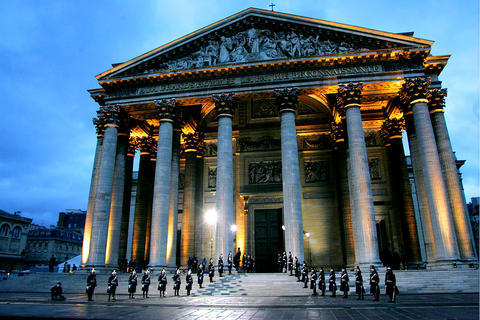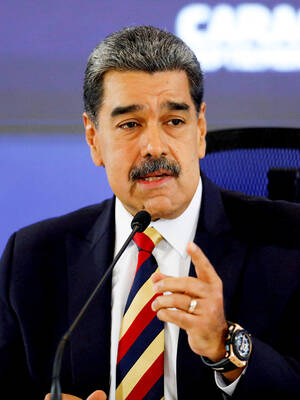It is one of Paris' most celebrated monuments, a neoclassical masterpiece that has cast its shadow across the city for more than two centuries.
But it is unlikely that the Pantheon, or any other building in France's capital, will have played host to a more bizarre sequence of events than those revealed in a court last week.
Four members of an underground "cultural guerrilla" movement known as the Untergunther, whose purpose is to restore France's cultural heritage, were cleared last Friday of breaking into the 18th-century monument.

PHOTO: EPA
For a year from September 2005, under the nose of the Pantheon's unsuspecting security officials, a group of intrepid "illegal restorers" set up a secret workshop and lounge in a cavity under the building's famous dome.
Under the supervision of group member Jean-Baptiste Viot, a professional clockmaker, they pieced apart and repaired the antique clock that had been left to rust in the building since the 1960s. Only when their clandestine revamp of the elaborate timepiece had been completed did they reveal themselves.
"When we had finished the repairs, we had a big debate on whether we should let the Pantheon's officials know or not," said Lazar Klausmann, a spokesperson for the Untergunther. "We decided to tell them in the end so that they would know to wind the clock up so it would still work."
"The Pantheon's administrator thought it was a hoax at first, but when we showed him the clock, and then took him up to our workshop, he had to take a deep breath and sit down," Klausmann said.
The Center of National Monuments, embarrassed by the way the group entered the building so easily, did not take to the news kindly, taking legal action and replacing the administrator.
Getting into the building was the easiest part, Klausmann said. The squad allowed themselves to be locked into the Pantheon one night, and then identified a side entrance near some stairs leading up to their future hiding place.
"Opening a lock is the easiest thing for a clockmaker," Klausmann said.
From then on, they sneaked in day or night under the unsuspecting noses of the Pantheon's officials.
"I've been working here for years," said a ticket officer at the Pantheon who wished to remain anonymous. "I know every corner of the building. And I never noticed anything."
The hardest part of the scheme was carrying up the planks used to make chairs and tables to furnish the Untergunther's cosy workshop, which has sweeping views over Paris. The group managed to connect the hideaway to the electricity grid and install a computer connected to the net.
Klausmann and his crew are connoisseurs of the Parisian underworld. Since the 1990s they have restored crypts, staged readings and plays in monuments at night, and organized rock concerts in quarries. The network was unknown to the authorities until 2004, when the police discovered an underground cinema, complete with bar and restaurant, under the Seine. They have tried to track them down ever since.
But the UX, the name of Untergunther's parent organization, is a finely tuned organization. It has around 150 members and is divided into separate groups, which specialize in different activities ranging from getting into buildings after dark to setting up cultural events. Untergunther is the restoration cell of the network.
Members know Paris intimately. Many of them were students in the Latin Quarter in the 1980s and 1990s, when it was popular to have secret parties in the French capital's network of tunnels.
The Untergunther are already busy working on another restoration mission Paris. The location is top secret, of course.

China on Monday announced its first ever sanctions against an individual Japanese lawmaker, targeting China-born Hei Seki for “spreading fallacies” on issues such as Taiwan, Hong Kong and disputed islands, prompting a protest from Tokyo. Beijing has an ongoing spat with Tokyo over islands in the East China Sea claimed by both countries, and considers foreign criticism on sensitive political topics to be acts of interference. Seki, a naturalised Japanese citizen, “spread false information, colluded with Japanese anti-China forces, and wantonly attacked and smeared China”, foreign ministry spokesman Lin Jian told reporters on Monday. “For his own selfish interests, (Seki)

VENEZUELAN ACTION: Marco Rubio said that previous US interdiction efforts have not stemmed the flow of illicit drugs into the US and that ‘blowing them up’ would US President Donald Trump on Wednesday justified a lethal military strike that his administration said was carried out a day earlier against a Venezuelan gang as a necessary effort by the US to send a message to Latin American cartels. Asked why the military did not instead interdict the vessel and capture those on board, Trump said that the operation would cause drug smugglers to think twice about trying to move drugs into the US. “There was massive amounts of drugs coming into our country to kill a lot of people and everybody fully understands that,” Trump said while hosting Polish President

Japan yesterday heralded the coming-of-age of Japanese Prince Hisahito with an elaborate ceremony at the Imperial Palace, where a succession crisis is brewing. The nephew of Japanese Emperor Naruhito, Hisahito received a black silk-and-lacquer crown at the ceremony, which marks the beginning of his royal adult life. “Thank you very much for bestowing the crown today at the coming-of-age ceremony,” Hisahito said. “I will fulfill my duties, being aware of my responsibilities as an adult member of the imperial family.” Although the emperor has a daughter — Princess Aiko — the 23-year-old has been sidelined by the royal family’s male-only

A French couple kept Louise, a playful black panther, in an apartment in northern France, triggering panic when she was spotted roaming nearby rooftops. The pair were were handed suspended jail sentences on Thursday for illegally keeping a wild animal, despite protesting that they saw Louise as their baby. The ruling follows a September 2019 incident when the months-old feline was seen roaming a rooftop in Armentieres after slipping out of the couple’s window. Authorities captured the panther by sedating her with anesthetic darts after she entered a home. No injuries were reported during the animal’s time on the loose. The court in the